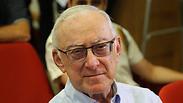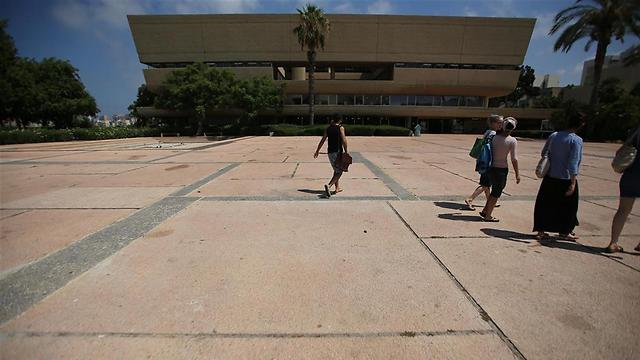
Prof. Asa Kasher. It won’t hurt to set out some rules in the political area
צילום: מוטי קמחי
Before objecting, professors should actually read ethical code
Op-ed: Most of the politics in academia has nothing to do with the right or left, but rather with friendships, cliques and schools of research. However, academics could use an ethical code that will occasionally remind them where they come from and what they will leave behind when they retire.
The most striking thing about the Haaretz Peace Conference, which was held Monday, and about the ethical code affair is that most people who oppose “the Right’s products” in the name of freedom of speech find it difficult to watch and listen to anything that conflicts with their opinion.

If they had read what Prof. Asa Kasher defined as an “educational document,” they would have sensibly argued whether it does any good or not, whether it’s necessary or not. If they were capable of arguing, they would also listen to the things Minister Naftali Bennett’s political plan is based on.
Instead, we received a batch of Pavlovian reactions with outcries about the end of democracy and dark times. A lovely professor, who I interviewed about the ethical code, argued that her lessons would now be controlled by committees. The police are on their way. This is North Korea. Because I deal with these rows on an almost daily basis, I have to ask myself who is enjoying this more: The one who trolls or the one who is being trolled? The perpetrator who pretends to be the victim, or the perpetrator who learns that he is a perpetrator from the reactions?

Tel Aviv University. Don’t silence people by using the ‘silencing’ slogan (Photo: Yaron Brener) (צילום: ירון ברנר)
Let’s start from the end of the ethical code row: The academia is not a sanctuary. There are real lecturers there, human beings who make mistakes, and there is a lot of politics as well. Unlike in the current debate, most of the politics has nothing to do with right or left; it has to do with friendships, cliques and schools of research. Ink-stained battles. The academics could use, however, an ethical code that will occasionally remind them where they come from and what they are they going to leave behind when they retire. They could also use a lesson in healthy common sense. For example, a thought exercise: What should be the fate of a factory worker who is working to make the factory lose money and shut down? Probably dismissal. And what about a lecturer who calls for a boycott on the institution that pays his salary? Is that okay, because there is academic freedom for foolishness?
It won’t hurt to set out some rules in the political area. As Asa Kasher asserted, an institution or a department cannot be affiliated with a party, otherwise we’ll establish an academic institution for every party, and one cannot receive academic credit points for political activity. The objection to these and other rules and ideas, I believe, is simply the result of the fact that the opponents have failed to read the document.
Having said that, there is one significant problem in the overall issue of the ethical code, regardless of whether the lecturer is left-wing or right-wing: The fear of controversial issues. Perhaps a mirror image of the ethical code initiated by an education minister from the Bayit Yehudi party. If the Pavlovian critics would only go to the trouble of separating the wheat from the chaff, they would say that section 3 of the “what is political activity” explanation is unclear and will therefore not be implemented.
Several months ago, I discussed Breaking the Silence’s introduction into the state educational system. A Zionist educational system must encourage significant military service and contribution to the state, rather than encourage doubts and present different narratives and post-modernism. I wrote at the time that philosophizing about nationality and the narrative battle is reserved for higher education, and I still stand behind those comments today.
It’s impossible to prevent politics from being part of the academic world. When I used to lecture at a university, I would use controversial issues to illustrate the study material. Bar Kochba’s digging system was compared to the Viet Cong and Hamas’ digging system, and the Romans’ victory was compared to the Israeli failure to defeat Hamas. It could have been seen as a right-wing attack. Some of my students accepted the equation, and those who didn’t argued with me.
During my time at the academia, I never met coward Israeli students. Are there radical left-wing professors who have turned the classroom into a reeducation arena? The answer is yes. There are a lot of complaints about one-sided preaching. But if I were a student, I would go there to listen and argue. If they discriminated against me, I would wage an all-out war against them. And if I didn’t have the energy, I would simply choose a different course.
There isn’t a single answer in social sciences and humanities, and there is no studying and education with polemics. I find US professors’ political correctness method weary and harmful. They have a liberal thought police there, which produced Donald Trump and the Tea Party movement as a counterreaction.
Asa Kasher did some serious work on a document for the purpose of recommendation and education, that’s it. It can be discussed and it can be argued. Please read it, and suggest an ethical code dealing with the foolishness of boycotts and with a definition of politics that can be dealt with rather than imposed. Let us argue, and listen. Don’t silence people by using the “silencing” slogan.










